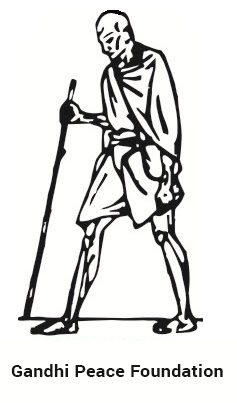All submissions are to be made electronically in the form of email attachments processed in MS word and should be addressed to:
John S Moolakkattu. E-mail: editorgmarg@gmail.com or moolakkattu@gmail.com
Gandhi Marg is published from New Delhi in the months of June, September, December and March every year. Original contributions on themes of national and international importance falling under the broad area of Gandhian Studies are invited from scholars and practitioners. Articles published in Gandhi Marg are refereed. It is presumed that an article submitted to Gandhi Marg is original, and has not been under the consideration of any another journal. In general, the articles should not exceed 8000 words including notes and references. Periodically, we also bring out special issues on selected themes. Shorter articles are carried in the section on notes and comments. Decisions on manuscripts will be made within three months. No fees are charged for submission or publication in this journal.
Recent Issues
Article Types and Word limit
| Article Types | Word Limit | |
|
Articles |
Abstract | 150 |
| Keywords | 5 | |
| Articles | 6000 – 8000 | |
| Notes and Comments | 1500 – 2500 | |
| Book Review | Less than 1000 words | |
| Review Articles | Not more than 6000 words | |
- The name of the author, institutional affiliation and complete address including email and telephone/fax should be supplied. A short biographical statement of the author containing information about the area of specialisation and principal publications is also necessary.
- British spellings should be used throughout the manuscript.
- Author-identifying information including acknowledgement should be placed on the title page and not on any other pages.
- When an abbreviation is used, it should be spelt out in full the first time.
- All notes should be numbered consecutively and placed at the end of the article rather than on each page.
- Gandhi Marg follows a slightly modified version of the Chicago Manual of style for referencing.
- Illustrations Collected Works of Mahatma Gandhi may be shortened to CWMG in the in-text reference with volume, and page numbers where one is quoting or paraphrasing from specific pages. Ideally, one should use the Collected Works for originality instead of relying on references to secondary sources drawn from Young India, Indian Opinion, Harijan etc.
In-Text references
Gandhi considered violence ’superior to cowardice’ (CWMG 50 : 20)
A more recent study (Chaturvedi 1988) has shown…
Matthews and Jones (1997) have proposed that…
Theory rises out of practice and, once validated, returns to direct or explain the practice (Stevens 1998).
If two or more references by the same author published in the same year are cited, distinguish these by adding a,b,c, etc. after the year: Johnson (1994a) discussed…
If you want to include two or more references within the same parentheses, use chronological order and separate with commas: …as discussed by several authors (Gupta 1993, 2003, Sharma 1995, Panigrahi and Jones 1997, Pandey 2004).
Three or more authors. If there are more than two authors, give the surname of the first author followed by et al. Poverty is not correlated with violence (Rana et al. 1997).
If you refer to a source quoted from another source, cite both in the text, but only list the work you read in the bibliography: A study by Shah (1960 cited Parel 1994) showed that…
“Human security is an essential focus of policy” (eds McGrew & Poku 2007, p. 8).
List references to all documents cited in the text under the heading References. They are listed in alphabetical order of authors’ names. If you have cited more than one item by a specific author relating to a specific year, they should be listed as a,b,c,d.
Books
Gandhi, M. K. (1950). Satyagraha in South Africa. Ahmedabad: Navajivan House
Rudolph, Susanne Hoeber and Rudolph, Loyd I. (1987). Gandhi. The traditional roots of Charisma. New Delhi: Orient Longman.
Edited Books
McGrew, A & Poku, NK (eds) 2007, Globalization, development and human security, Polity, Cambridge, UK.
Chapters in edited books
Murphy, A. (2001) ‘Understanding globalism through a rural locale’, in O’Riordan, T. (ed.) Globalism, localism and identity. London: Earthscan, pp. 100-110
Journal articles (add DOI if available).
Dhupelia-Mesthrie, U. and Weintroub, J. (2020) ‘Going beyond Gandhi’s ‘inner circle’ of relationships: Satyagraha House, Hermann Kallenbach and Gandhi’s sons’, Critical African Studies, 12(2), pp. 140–170. doi: 10.1080/21681392.2020.1751669.
Haksar, V. (2012) ‘Violence in a spirit of love: Gandhi and the limits of non-violence,’ Critical Review of International Social and Political Philosophy, 15(3), pp. 303–324. doi: 10.1080/13698230.2011.644422.
Mishra, M. K., Upadhyaya, P., and Davis, T. P. (2023) ‘Tracing the legacy of peace leadership from an Asian perspective: Mahatma Gandhi, Dalai Lama, and Thich Nhat Hanh’, Journal of Peace Education, 21(2), pp. 231–253. doi: 10.1080/1740020
Newspaper articles and online sources
Keenan, D. (2011) ‘North voters go to polls today,’ Irish Times, 5 May. Available at http://www.irishtimes.com/newspaper/ireland/2011/0505/1224296146826.html. (Accessed 5 May 2011).

